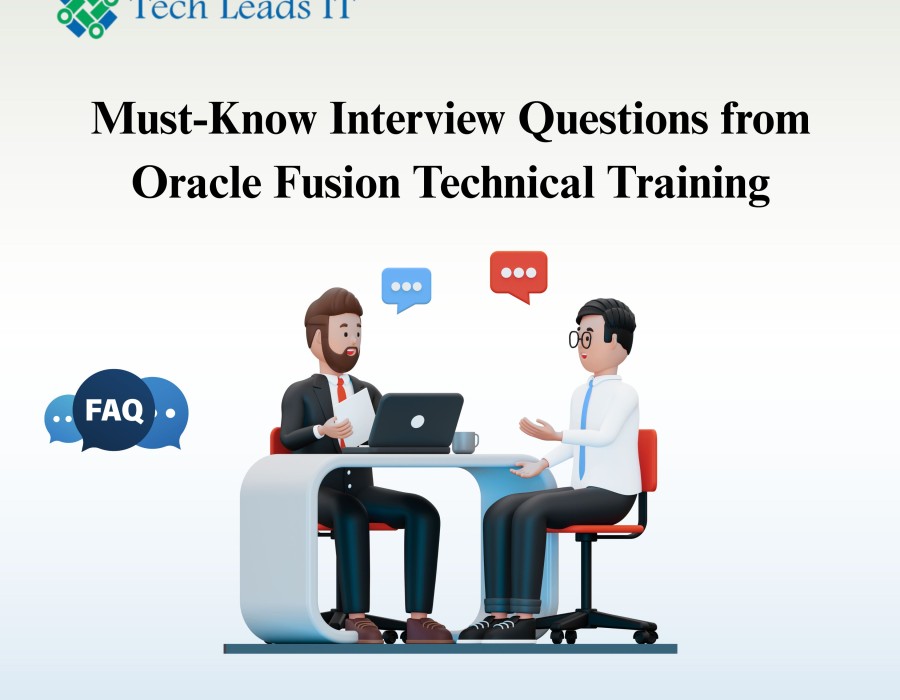Introduction
Oracle Fusion is one of the most sought-after ERP systems in the industry, and technical expertise in this platform is highly valued by employers. Oracle Fusion Technical online Training equips professionals with the skills needed for development, integration, customization, and reporting in Fusion applications. Preparing for interviews with real-world questions can give you an edge. This blog covers 20 must-know interview questions along with simple answers to help you crack your next job.
Interviews made easy! Here are the Top 20 Oracle Fusion Technical Interview online Questions and Answers that every professional should know. Learn them, practice them, and crack your next job with the confidence built from Oracle Fusion Technical Training.
Basic Questions
Q1: What is Oracle Fusion Technical Training?
A: Oracle Fusion Technical Training teaches technical aspects of Oracle Fusion, including RICE components, integrations, reporting, and workflow customization. It helps beginners gain hands-on experience for real-world projects.
Q2: What are RICE components?
A: RICE stands for Reports, Interfaces, Conversions, and Extensions. These components are used to develop and customize Oracle Fusion applications.
Q3: What is FBDI?
A: File-Based Data Import (FBDI) is a method to upload bulk data into Oracle Fusion using predefined templates.
Q4: What is BI Publisher?
A: BI Publisher is a reporting tool used to design, format, and distribute structured reports in PDF, Excel, and HTML formats.
Q5: What is a Flexfield?
A: Flexfields are customizable fields used to capture additional business data. They include key and descriptive flexfields.
Q6: What are Lookups in Oracle Fusion?
A: Lookups are predefined lists of values used across fields in Fusion applications to maintain data consistency.
Q7: What is a Scheduled Process?
A: A scheduled process is a task in Fusion that runs automatically at a defined time, such as data loads or report generation.
Intermediate Questions
Q8: What is Oracle ADF and how is it used?
A: ADF (Application Development Framework) is used to customize Fusion applications, create pages, components, and workflow extensions.
Q9: What are integrations in Oracle Fusion?
A: Integrations connect Fusion with other systems using Web Services (SOAP/REST), File-Based methods (FBDI, HDL), and Oracle Integration Cloud (OIC).
Q10: What is OTBI?
A: Oracle Transactional Business Intelligence (OTBI) is used for real-time ad-hoc reporting directly on transactional Fusion data.
Q11: What is HDL?
A: HCM Data Loader (HDL) is used for importing bulk HR data like employees, jobs, or positions into Fusion.
Q12: How can you customize workflows in Fusion?
A: Workflows can be customized using BPM Worklist, Workflow Designer, and approval rules to automate business processes.
Advanced Questions
Q13: Explain the difference between OTBI and BI Publisher.
A: OTBI is for real-time ad-hoc reporting, while BI Publisher is for structured, formatted, and scheduled reports.
Q14: What are HCM Extracts used for?
A: HCM Extracts help extract HR data in structured formats for payroll, reporting, and third-party integrations.
Q15: What is Oracle Integration Cloud (OIC)?
A: OIC is middleware that connects Oracle Fusion with other applications using prebuilt adapters and integration flows.
Q16: How do you handle data migration in Fusion projects?
A: Data migration is handled using FBDI, HDL, and scheduled processes for bulk data uploads.
Q17: What is the role of a Technical Consultant in Oracle Fusion?
A: Technical Consultants develop RICE components, manage integrations, perform reporting, and customize applications to meet business needs.
Q18: How do you perform security and role management in Fusion?
A: Security is managed through role-based access controls, defining duties, privileges, and data access levels.
Q19: What are ADF extensions and when are they used?
A: ADF Extensions are used for advanced customizations, adding new UI pages, components, and functionality beyond standard Fusion capabilities.
Q20: How is error handling done in integrations?
A: Errors in integrations are logged in OIC or Fusion interfaces. Technical consultants troubleshoot using logs, data validation, and exception handling.
Q21: How do you optimize Fusion reports for performance?
A: Optimize by designing efficient queries, limiting data scope, using OTBI caching, and scheduling heavy reports during off-peak hours.
Q22: Why is Oracle Fusion Technical Training essential for career growth?
A: Training provides hands-on project experience, prepares for interviews, and equips professionals with in-demand skills, increasing employability in ERP roles.
Conclusion
Preparing for interviews with Oracle Fusion Technical Training knowledge is essential for anyone aiming for a successful career in ERP systems. Understanding RICE components, integrations, reporting tools, and workflow processes gives you the confidence to tackle real interview questions and secure top positions in IT.





Comments